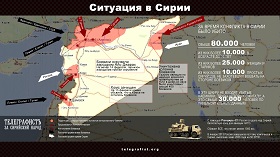Interview
The world community’s eyes are riveted on Syria. While they wait for the UN experts to present their report on allegations of chemical weapons use, world powers are discussing the possibility and relevance of a military strike against Syria. We are talking to Dr. Maxim Bratersky, Head of the World Politics Department at the Higher School of Economics, about the U.S. position on Syria and the prospects for an attack on the country.
Interview
The world community’s eyes are riveted on Syria. While they wait for the UN experts to present their report on allegations of chemical weapons use, world powers are discussing the possibility and relevance of a military strike against Syria. We are talking to Dr. Maxim Bratersky, Head of the World Politics Department at the Higher School of Economics, about the U.S. position on Syria and the prospects for an attack on the country.
Some pundits expect the Syria situation to escalate into a large-scale war in the Middle East. How would you assess the dimensions of the crisis?
The crisis is clearly quite apparent. However, I would disagree with the experts you cite for two reasons. First, the civil war in Syria has been going on for over two years, and U.S. interference would escalate it. Second, a large-scale war does not seem to be on the agenda.
The Middle East has already seen its fair share of wars, i.e. Iraq and Libya. As of today, the armed conflict in Syria may enter a new phase. The only thing that seems to be missing is a Iran-Israel clash with Saudi involvement. Should this happen, the conflict could well be classed as a major war, although I envision nothing of the kind taking place in the current context. Iran, Saudi Arabia and Israel are not eager put up a fight.
If international military intervention against Syria cannot be prevented, it should be limited to an airstrike with no ground operation. Hence, the phrase big war does not seem to fit the situation.
Could the United States afford a new large-scale war, similar to its Iraq and Afghan operations, in view of its dire economic predicament?
Any use of modern ground forces and navy is certainly costly. But since what we are looking at here is a single strike, the U.S. economy would certainly survive that – as it is the kind of action provided for in the defense budget, as all aspects of a possible military campaign are covered during “war games” scenario planning.
Until Barack Obama said unexpectedly that it was time to act on Syria since the "the red line was crossed," the White House had been rather cautious compared to some European countries, such as France. Washington had preferred to keep apart and insisted on a political solution, with no weapons sent to the Syrian opposition or American troops dispatched, trying to stay away. I hope Obama will be sensible enough to ensure U.S. interference takes place on a limited scale.
Do you think a strike will take place?
Attempting to read the tealeaves is a thankless task. However, a strike seems imminent, although without any commitment of marines or tanks. Surgical airstrikes are likely against WMD (Weapons of Mass Destruction) development and storage sites and command centers. Then the Americans will establish something like no-fly zones, etc. I am afraid that the attack is about to happen, especially since there seem to be no more doubts about the use of chemical weapons. Currently, the question is about the user, which we may never know. Bashar Assad is unlikely to have ordered the CW (chemical weapons) attack, since the move is absolutely against his interests. It could have been an act of provocation by any one of a number of foreign forces, not just U.S. or European but primarily regional, say from Qatar or Saudi Arabia.
How could the U.S. strike impact Russian-American relations? Are worsening tensions looming?
The bilateral dialog seems to be damaged enough – almost as if the strike against Syria had already taken place.
In fact, the Russia-U.S. relationship has no prospects at the moment. What we see is a confluence of many factors – the strategic agenda is exhausted, economic interests are nonexistent, and geopolitical differences are on the rise. At the same time, these problems could have been dealt with had it not been Obama's profligate policies, especially in foreign affairs, as he achieved nothing spectacular apart from signing the strategic arms agreement.
As I see it, the Obama administration is attempting to use Syria to compensate for his failures vis-à-vis Congress, while ideological grounds and pretexts for American participation in the Syrian crisis definitely exist. Obama's decisions on this are by no means unsubstantiated, although a strike against Syria could have been (could still be) avoided had the administration been successful on other tracks.
Interviewer: Daria Khaspekova, RIAC Program Coordinator





